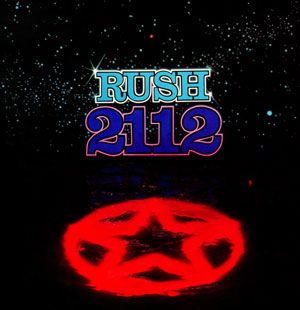A New Kind of Anthem.
 •
by
•
by Geoffery Openshaw

This is the second of two albums that got me into the whole progressive rock thing.
While generally considered Progressive Rock this album sits on the fence a little, balancing between Progressive Rock and Hard Rock.
2112 - RUSH

Line-up.
Vocals, Bass Guitar - Geddy Lee
Guitar - Alex Lifeson
Drums - Neil Peart
Background.
As their previous album, Caress of Steel, had been a relative commercial failure, Mercury (their record label at the time) pressured the band not to do another album with "concept" songs. Caress of Steel contains two multi-part epics: the twelve-minute "The Necromancer" and the twenty-minute long "The Fountain of Lamneth".
However the band ignored this advice and stuck to their guns. 2112 became their first major commercial success, ultimately a signature record of theirs and in my opinion one of the greatest rock albums ever.
2112 would be the fourth studio album from Rush. It was released in 1976 and features an eponymous seven-part suite written by Geddy Lee and Alex Lifeson, with lyrics written by Neil Peart. It tells a dystopian story set in the year 2112, with the plot lifted in broad strokes from the Ayn Rand novel Anthem. Even though the songs after the 2112 "suite" are unrelated to it, the album is still generally seen as a concept album. The other songs on the album have Lee and Lifeson writing lyrics for one song each ("Tears" and "Lessons," respectively) and all other lyrics were written by Peart.
"Tears" would be the first Rush song to feature an outside musician. Hugh Syme, who would play keyboards on a number of Rush songs in the future, (e.g., "Different Strings" on Permanent Waves and "Witch Hunt" on Moving Pictures) contributes a multi-tracked Mellotron string and flute part to the track.
The Album.
The album opens with the concept suite 2112. The "sci-fi" sounds in the beginning of the song were created using an ARP Odyssey synthesizer and an Echoplex tape delay. It features many different "styles" of playing, hard rock interspersed with gentle acoustic moments and melancholic rock building to the tracks finale. The musical and vocal talents of the band convey the hope, frustration, disappointment and anger of the songs narrator with ease.
After this the songs take on a more direct hard rock approach. A Passage to Bangkok is the next track on the album, or the first track on side 2 if you prefer
🙂. It opens with a variation on what might be called an oriental riff, and goes on to describe, through subtleties and tongue in cheek references, drug tourism and features some outstanding guitar work and bluesy undertones from Alex Lifeson.
The Twilight Zone creates a rather spooky, almost trippy ambiance, with Geddy Lee trying his best to sound ethereal as they sing lyrics inspired by the TV show of the same name. The song itself was written and recorded in one day.
Lessons is up next and works well at melding acoustic and electric guitar riffs. It has a very uplifting melody punctuated by lyrics about learning from life's mistakes and experiences and for is the standout track on side 2 for me because of the way it makes you feel.
Although ballards were never their strong suite Tears should be given an A for effort. It has a haunting melody and beautifully delivered lyrics by Lee and guest mellotronist Hugh Syme provides excellent atmospheric backing melodies.
Something for Nothing closes out the album. It's a solid song with hard rock sensibilities, a great chorus and lyrics and music full of passion and soul.
Hope you enjoyed this article and I hope you stick around for more.
Geoff.


Comments
Voted, still say you can't beat a bit of The Almighty.
RUUUUUUUUSH! \o/
Saw them in 2011 on the Time Machine tour in Newcastle... Was the best day of my life!
Seen them twice in London, once on the 30th anniversary tour and the second for the Snakes & Arrows tour. Twas awesome!
Peart is a hero of mine, I decided to learn to play drums when I was listening to YYZ 😛
They are a treasure, one of the greatest bands of all time, not just live 🙂
His off-beat technique is amazing
vote 7 sub 20
Thanks 🙂
Friend of Dr Hugh Jardon is a friend of mine....and your welcome.
needs moar Michael Schenker
I will do some research and earmark him for a future article then maybe.
http://www.youtube.com/watch?v=n0OatiI5XcE
Going to see them in June 2013